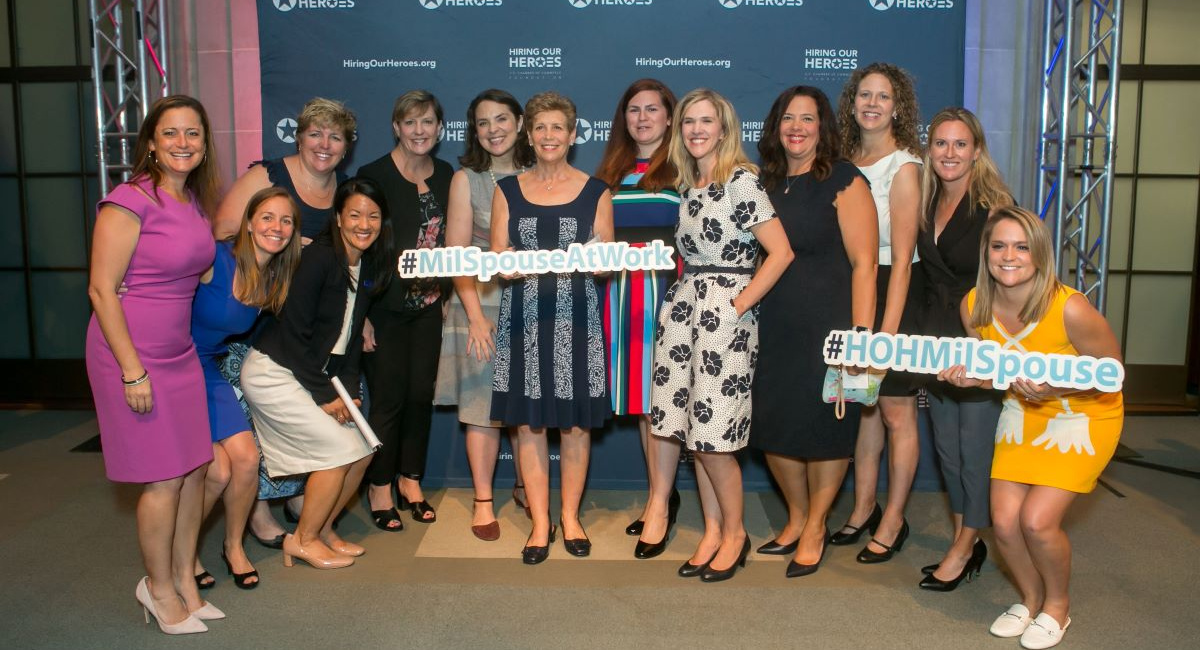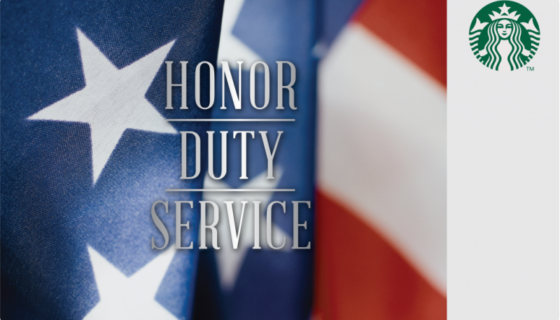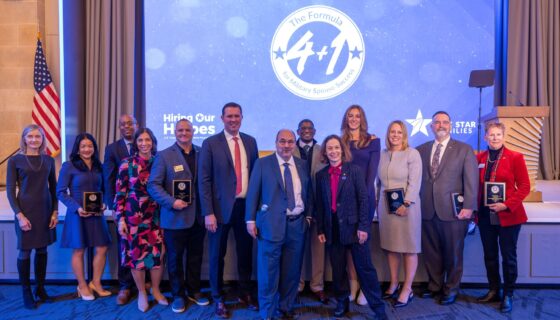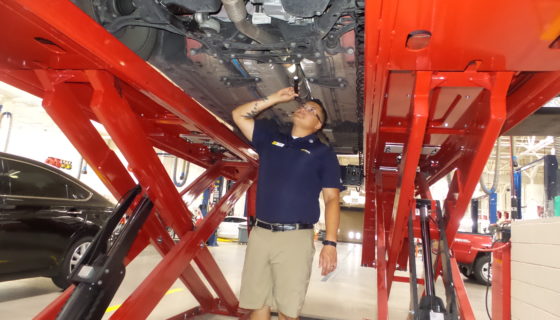4 Military Spouses in Senior Leadership Roles Share Their Tips for Success

Military spouses are persistent, determined, and indefatigable.
This collective workforce experiences numerous uncontrollable challenges. Yet, these men and women are open to reinventing themselves professionally, often trading low wages for resume gaps, so that our service members can honor their commitment to this country in the midst of our longest running war.
Many – but not all – military spouses toil with the tribulations of unemployment and underemployment. Through determination and grit, a growing number of military spouses are quietly navigating promotions at military-ready employers throughout the country.
Meet four military spouses who have climbed the corporate ladder to senior leadership positions and hear their tips for replicating their success.
Embrace the Power of Your Military Spouse Network
Elizabeth O’Brien’s rise to the executive level at the U.S. Chamber of Commerce Foundation’s Hiring Our Heroes started with an invitation for coffee.
Many years ago, O’Brien, an Army spouse, was living with her children in a hotel room on Fort Leavenworth. Their assignment to Kansas was short – only three months. Her family was living out of their suitcases and trying to make the best of their temporary situation.
When an acquaintance invited O’Brien over for coffee, she immediately said yes. Coffee was followed by dinner, dinner followed by play dates. Soon, a friendship between two military spouses blossomed.
Seven years later, O’Brien and her friend were both living in Washington, D.C. O’Brien wanted to work with the Washington Wizards; her friend gave her a tip on a job at Hiring Our Heroes. O’Brien faced a difficult decision.
“I had moved seven times in eight years and worked for a decade as a college basketball coach. I felt like I couldn’t continue a long-term career in college sports because I was going backwards and taking salary cuts every time we moved,” O’Brien said.
In order to progress in her career, O’Brien needed to reinvent herself.
“I had an opportunity that could lead to my dream job, but I had to be willing to put myself in a position that was uncomfortable,” she said. “I hadn’t ever considered working at a nonprofit, but she said ‘I think you would excel.”
Today, O’Brien is the Senior Director of Military Spouse Programs at Hiring Our Heroes. She oversees a team of employees and volunteers who manage 53 Military Spouse Professional Networks around the world. They are leading change at the local level through the launch of over a dozen Military Spouse Economic Employment Zones. And they host numerous events and promotions, such as the upcoming third annual Military Spouse Employment Summit.
“That’s the power of the spouse network,” O’Brien said. “The growth of the military spouse program (at Hiring Our Heroes) presented me with opportunities to pursue my career goals, connect with military spouses on the private side, and broaden my network.”
Be Open to New Opportunities
One of Amazon’s leadership principles is “Learn and Be Curious.” As an organization, Amazon encourages its leaders to step outside their comfort zones and areas of expertise. This “Learn and Be Curious” principle has positively impacted Kate Viar’s career.
Viar works as the Director of Worldwide Public Sector Engagement for Amazon Web Services – a term-limited executive development role that allows Viar to shadow and learn from leaders within the worldwide AWS public sector business.
“This has been an incredible opportunity to learn about a whole new part of the business, completely outside of my area of expertise and comfort zone,” Viar said. “As my boss always says, you need to ‘find a hole and fill it,’ and by doing that you evolve and grow. I think that is very similar to what military spouses do.”
This Army spouse feels that she wouldn’t be working at the executive level if she wasn’t willing to embrace a philosophy of constant reinvention.
“My best advice is to never stop learning and developing your skills, even if you land in a remote location without relevant job opportunities,” Viar said. “Do not view your career trajectory as a rigid line; instead think about the skills you will need to get you into an executive role down the road.”
New opportunities aren’t always tied to a relocation. New opportunities can be found at your current employer too.
When Air Force spouse and Navy veteran Cathy Breeze joined Booz Allen Hamilton in its Capital Region office, her entire team was made up of veterans and military spouses. A year later, her husband received orders to Colorado Springs. Back then, Booz Allen didn’t have a thriving business in Colorado, but senior leadership had a vision to expand its corporate footprint. They asked Breeze to be part of this effort.
“When I got there, there was only four of us. When I left there was over 500 of us,” Breeze said.
In the 23 years Breeze worked for Booz Allen Hamilton in Colorado Springs, she never had the same job for more than two years.
“It was constantly evolving…missions, roles, and opportunities. That was the exciting aspect of being part of small office — you got the opportunity to be part of every facet of growth,” Breeze said.
Success Is a Team Sport
As a Navy spouse, Jennifer Simpson never dreamed she would work at the executive level.
Simpson was stationed at Sigonella, Sicily, when she interviewed for a contractor position through Wittenberg Weiner Consulting (WWC). Since inception, WWC has hired more than 150 military spouses into professional-level positions and 43% of its management team is composed of military spouses.
Eight years after starting as a contractor, Simpson is now the vice president of WWC’s Defense Business Line. In the last three years, she has expanded the firm’s presence in Hampton Roads, Virginia, from four consultants to 15. Military spouses make up 50% of Simpson’s team.
“I really do believe that the driving force for my success is my team,” Simpson said. “They are the most passionate and committed workforce. They drive me to want to get more opportunities and build our business in Norfolk so that we can give more employment opportunities to military spouses here.”
Work for Military-Friendly Employers
Before Wittenberg Weiner Consulting, Simpson was on the military spouse career hamster wheel.
“Typically what would happen is that I would get in at an entry level position every two to three years when we move, prove myself, and show that I was able to do the job and able to move onto the next level. Then we would move and I would start over again,” Simpson said.
Then she interviewed with WWC.
“I’ve probably been on 100 job interviews and the fact that I’m a military spouse is usually the elephant in the room,” Simpson said. “I knew that they (WWC) were supportive of military spouses, not because I disclosed that I was a military spouse, but because they shared their company culture with me. It was the first time in a job interview that it was positive that I was a military spouse.”
When Breeze transitioned out of the Navy, her goal was to work for a company that valued veterans and women. She said she left the Navy after 10 years because of limited opportunities for women to promote in the Navy at that time. She was a cryptographic technician.
Since Breeze had experienced the glass ceiling as a female sailor, she refused to allow it to impact her career as an Air Force spouse.
Today, Breeze is a Vice President at Booz Allen Hamilton. She uses her decades of intelligence, defense, and combatant command experience to help the Department of Homeland Security tackle its most complex issues. She also helps to promote the hiring and support of veterans and military spouses at Booz Allen.
“I can honestly say I’ve never felt held back – I’ve only been encouraged at Booz Allen,” Breeze said. “They’ve trusted me to take on new roles. They empowered me to bring my whole self. As an organization I think that’s how we are.”
Simpson, who is a Navy veteran, said WWC is the same way.
“They gave me the opportunity to progress my career, which is incredible for a small business to be able to do that for someone. They are the most military spouse-friendly company that I’ve ever been around,” she said.





